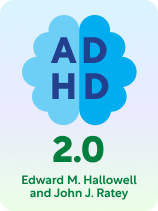

This article is an excerpt from the Shortform book guide to "ADHD 2.0" by John Ratey and Edward Hallowell. Shortform has the world's best summaries and analyses of books you should be reading.
Like this article? Sign up for a free trial here.
Does ADHD have any benefits? What’s the “ADHD superpower”?
In ADHD 2.0, psychiatrist Edward Hallowell and professor of psychiatry John Ratey argue that people can succeed and thrive because of—not in spite of—having ADHD. One reason for this is that the cloud of ADHD has a silver lining.
Continue reading to discover four advantages of ADHD that people with this condition can leverage.
Advantages of ADHD
The authors describe ADHD as a condition of opposite extremes—for every exceptional challenge that people with ADHD face, they have an exceptional strength to balance it. Here, we’ll highlight four advantages of ADHD.
1) People with ADHD can hyperfocus. A condition characterized by a lack of focus also comes with a tendency to focus so intensely on something that the rest of the world might as well not exist.
Hyperfocus is how people with ADHD can put off large projects until the last minute and then do a week’s worth of work in a day—that’s why it’s sometimes referred to as the “ADHD superpower.” Hyperfocus also explains why a child with ADHD who can’t sit still for a single class period can get lost in a video game or book for hours on end.
(Shortform note: Hyperfocus isn’t an official symptom of ADHD, and people without ADHD sometimes enter hyperfocus as well. However, some research shows that hyperfocus comes more easily and more frequently to people with ADHD. Unfortunately, this isn’t always a good thing—if you have ADHD, you might find yourself hyperfocusing on things that aren’t important at the moment, like playing video games or watching TV shows when you should be getting ready for work.)
2) People with ADHD are energetic. The fidgety restlessness that’s so common with ADHD can become a seemingly inexhaustible supply of energy when there’s an interesting task to put that energy toward. For example, a “poor” student who can’t sit still in class might be their school’s star athlete.
(Shortform note: Like many things about ADHD, energy levels often come in opposite extremes: uncontrollable nervous energy alongside near-constant fatigue. One possible explanation for this fatigue is that, if you have ADHD, you may have trouble sleeping. Another is that you naturally struggle to regulate your energy use—your brain is constantly in overdrive, which uses a lot of energy and leaves you feeling drained and tired.)
3) People with ADHD are emotional. This is both a challenge and a strength. People with ADHD are prone to intense anger, frustration, and sadness. However, they can also be highly empathetic, extremely cheerful, and fiercely devoted to their loved ones.
(Shortform note: These extreme feelings are part of emotional dysregulation: an inability to manage your emotions. Your emotions might be so powerful that they cause you a great deal of stress, and you’re unable to bring those feelings under control. Notably, while emotional dysregulation has typically been associated with negative emotions like anger and sadness, some recent research shows that it may also happen with positive emotions like joy and mirth.)
4) People with ADHD are highly creative. Their racing thoughts, along with their tendency to connect apparently unrelated concepts, mean that people with ADHD are extremely good at coming up with innovative new ideas.
| Linear vs. Associative Thinking This creativity may come from the fact that people with ADHD tend to think associatively rather than linearly. In other words, if you have ADHD, you may not follow a clear step-by-step thought process. Instead, you quickly make mental connections between various topics, and your thoughts may jump between those topics. As a result, you can find inspiration in seemingly mundane things. For example, suppose that it’s time to feed your dog. A linear thought process would simply go through the steps needed to do that: Open the dog food bag, scoop out a serving, put it into the dog’s bowl, and set the bowl on the floor. On the other hand, if you’re an associative thinker, your thought process might look more like this: • It’s time to feed the dog. • There’s a dog in John Wick. • John Wick stars Keanu Reeves. • Keanu Reeves also starred in The Matrix. • The Matrix popularized “bullet time” (super-slow motion during exciting moments). • Could the bullet time effect be translated into text for a creative writing project? • In my next writing project, maybe I could intentionally slow down the pacing and describe every action in detail… |

———End of Preview———
Like what you just read? Read the rest of the world's best book summary and analysis of John Ratey and Edward Hallowell's "ADHD 2.0" at Shortform.
Here's what you'll find in our full ADHD 2.0 summary:
- How people can thrive because of—not in spite of—having ADHD
- The biological causes of ADHD and its most prominent symptoms
- Ways to minimize ADHD's downsides and maximize the benefits






